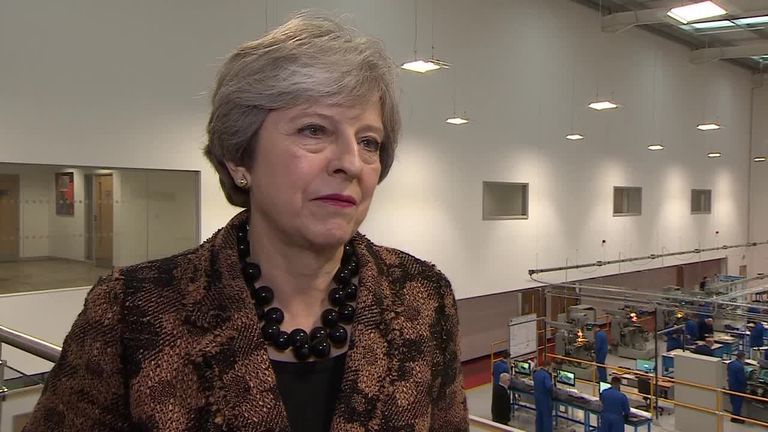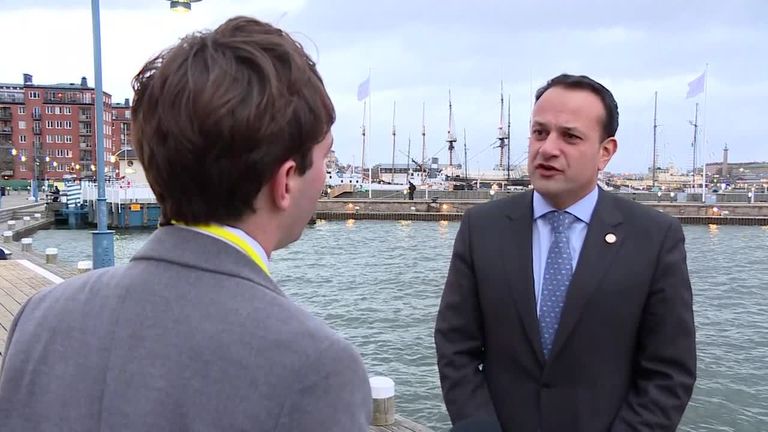EU: UK has 10 days to sort divorce settlement
Donald Tusk tells Theresa May he cannot allow Brexit talks to move onto trade and transition unless the UK meets his deadline.
Saturday 25 November 2017 05:55, UK
The President of the European Council has given the UK 10 days to meet EU demands on the Brexit divorce settlement.
After an hour-long private meeting with Theresa May in Brussels, Donald Tusk said he would not be able to allow the Brexit negotiations to move to the crucial trade and transition phase unless the UK meets his deadline.
In the clearest signal yet that the EU side sees itself as the driver in the Brexit negotiations, Mr Tusk said: "Sufficient progress in Brexit talks at December European Council (summit) is possible.
"But still a huge challenge.
"We need to see progress from UK within 10 days on all issues, including on Ireland."
An EU source, who was at the meeting, added: "Prime Minister May agreed to this timeframe.
"If no progress within next 10 days, it will not be possible for Mr Tusk to propose draft guidelines for the second phase of the talks on the transition and the future relationship."
Mrs May's assessment of the same meeting was more upbeat, insisting the "atmosphere was positive".
"There are still issues across the various matters that we are negotiating on to be resolved but there's been a very positive atmosphere in the talks and a genuine feeling that we want to move forward together," she said.
Mrs May held a flurry of other bilateral meetings on the sidelines of a summit called to discuss ways of supporting counties on the EU's eastern flank, threatened by Russian aggression.
The meetings, with the Lithuanian, Belgian, Danish and German leaders are being presented by the UK as useful, constructive engagements.
A Belgian government source told Sky News that Mrs May and Belgian PM Charles Michel had very comprehensive discussions about how to progress on all the Brexit divorce issues.
Belgium is among a group of EU states with a huge trade relationship with the UK and therefore keen on a good trade deal.
The meeting with the German Chancellor Angela Merkel was hastily organised and an important moment of engagement. "Very constructive," a Downing Street source said.
Mrs Merkel is a key EU player which the UK wants on side. But she is distracted from Brexit by her own fragile domestic politics as she tries to form a collation government.
Assessing his meeting with Mrs May, the Danish Prime Minister, Lars Lokke Rasmussen, told Sky News: "It was very constructive. It wasn't a negotiating meeting. She informed me; briefed me about how she looks at things. And from my perspective it seems that there is progress. So I've decided to be optimistic about this and I really hope that we can move forward in December."
It's not clear if Mrs May privately committed to parting with more money as part of the so-called Brexit bill.
At a meeting with Cabinet colleagues at the start of the week it's thought she sought agreement to increase the amount the Government is prepared to pay.
In her Florence speech in September she pledged to honour the UK's financial commitments - thought to amount to about £20bn.
However the EU has said that if the UK is to "settle its accounts" as it leaves the EU, it should pay a much higher figure, thought to be about £40-50bn.
The question of money is one of three divorce issues which the EU wants agreed before negotiations can move to transition and trade talks.
On the second issue - citizens rights - there remain disagreements over the role of the European Court of Justice.
But it is the third divorce issue - the Irish border question - which is now proving to be the most intractable.
The Irish government says talks cannot move to phase two until the UK gives Dublin a written and tangible assurance that there will be no hard border between Northern Ireland and the Republic or Ireland after Brexit.
The British government has been unable to do this because, by insisting that the the UK is leaving the single market and customs union, a physical border of some form appears inevitable.
Asked by Sky News if his country would be willing and able to veto talks moving to the trade phase, and if he has the support of the rest of the EU, the Irish Foreign Minister, Simon Coveney was firm.
"Yes, absolutely... and we have seen no suggestion of other countries moving away from that position of solidarity. We want to work with Britain.
"We want to be fair but firm in protecting what are really important Irish issues for the future and I think the British government understand that now."
An EU source added that particular attention was now being paid to the Irish issue.
"The UK will need to give credible assurances as to how to avoid a hard border before 4 December, as it is still unclear how this can be done," the EU source said.
Mrs May is due back in Brussels on the 4 December deadline for a key Brexit dinner with EU Commission President Jean-Claude Juncker.









